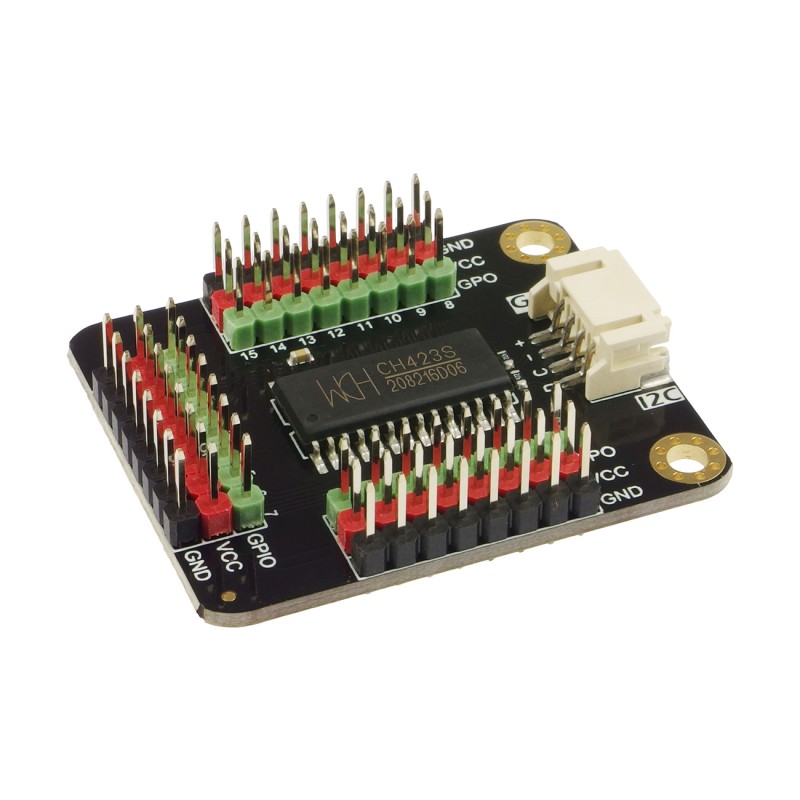







A 24-channel input/output port expander module controlled via I2C interface. It is based on the CH423 chip. E8 ports can operate as inputs/outputs and 16 only as outputs. The maximum output current should not exceed 15 mA, and the pins are compatible with 3.3 V and 5 V. The expander will prove useful for LED lighting or matrix display projects. Full documentation is available on the product wiki page.
Manufacturer BTC Korporacja sp. z o. o. Lwowska 5 05-120 Legionowo Poland sprzedaz@kamami.pl 22 767 36 20
Responsible person BTC Korporacja sp. z o. o. Lwowska 5 05-120 Legionowo Poland sprzedaz@kamami.pl 22 767 36 20
No product available!
Expansion board for Arduino, allows easy connection of XBee modules, has separate outputs for I2C, SPI and UART buses. The built-in 3.3V voltage stabilizer and operating mode switch make it easier to program the Arduino when the XBee module is connected to the sockets. DFRobot DFR0265
No product available!
A set of 10 cables, 30 cm long, compliant with the Gravity standard. DFRobot FIT0513
8-channel IO expander with 6 analog inputs. It communicates via the USB interface. Version with Pull-Up resistors. Numato Lab GP80001P
No product available!
64-channel IO expander with 32 analog inputs. It communicates via the USB interface. Numato Lab GP640001
No product available!
32-channel IO expander with 7 analog inputs. It communicates via the USB interface. Numato Lab GP320001
Module with a 16-channel GPIO expander with the ability to control LEDs. Equipped with a STEMMA QT connector, it communicates via the I2C interface. Adafruit 4886
128-channel IO expander with 32 analog inputs. It communicates via the USB interface. Numato Lab GP1280001
No product available!
16-channel GPIO expander with an I2C interface microcontroller can interface with 16 fully configurable digital input/output pins. It can produce PWM signals, so you can dim LEDs. It can be set to blink or even breathe pins at varying rates. With a built-in keypad engine, it can interface with up to 64 buttons set up in an 8x8 matrix. BOB-13601
I2C multiplexer module with TCA9548A system. Allows you to connect up to 8 devices. The system works like a gateway - it transmits I2C interface data to one of the 8 main busses. This allows you to connect up to 8 devices with the same address. Adafruit 2717
Module with an IO pin expander based on the TCA9534 system. It allows you to add 8 GPIO pins to an I2C-controlled project. SparkFun DEV-17047
The KAmodPCAL6408 is an 8-bit I/O expander with the PCAL6408A chip by NXP, controlled by the I2C interface.
DAQ device based on Ethernet communication and equipped with 24 digital inputs/outputs and a counter input. It allows you to control devices via the Internet. Digilent 6069-410-052
No product available!
DFRobot DFR1193 module with the LTC4316 chip enables the simultaneous use of multiple identical I2C sensors without address conflicts. It supports quick configuration via DIP switches or resistors, offering a flexible and reliable solution for IoT, robotics, and automation projects.
32-channel IO expander with 14 analog inputs. The board communicates via the Ethernet interface. Numato Lab GPETH320001
RS485 hub with DIN rail mounting capability. It is equipped with one RS485 input port and 8 RS485 output ports. Designed for communication within industrial networks. Waveshare RS485-HUB-8P
Module with 8 digital inputs and 8 digital outputs. It communicates via the RS485 interface and supports the Modbus RTU protocol. The board is enclosed in an industrial housing. Wellpro WP8028ADAM
The KAmod I2C-IOexp16 module is an extension equipped with 16 programmable digital lines (inputs or outputs), based on the MCP23017 system and controlled via the I2C bus with the possibility of connecting up to 8 modules thanks to addressing. The module works with a voltage from 2 to 5 V, has an interrupt output and allows for a current flow of up to 20 mA on each line
KAmod I2C Hub8 enables splitting the I2C bus into eight independent channels with a voltage translation function, which allows effective integration of multiple devices with repeating addresses. The module is recommended for advanced microprocessor projects with bus separation requirements and diverse voltage levels.

A 24-channel input/output port expander module controlled by an I2C interface. It was based on the CH423 chip and equipped with a Gravity connector. DFRobot DFR0979
